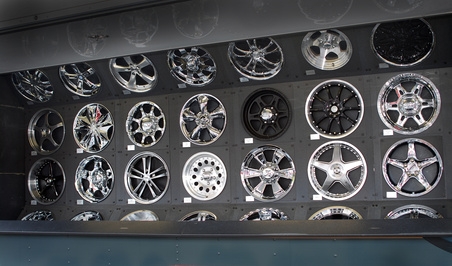
Chrome wheels have graduated to the big time. Once the exclusive province of young hotshots and "Fast and the Furious" wannabes, these wheels are now appreciated and used by a broad spectrum of auto enthusiasts. The shine of the wheels complements any custom job and can add resale value to a car on the market. The news isn't all good, though. Chrome wheels come with their fair share of problems that any potential customer should be aware of.
Recently, home flat tire "fix-it" kits have grown popular. These kits involve pushing chemicals into a flat tire to inflate it while also fixing any small damage in the exterior of the rubber. These chemicals can also wreak havoc on chrome wheels. The chemicals interact with the chrome plating under the tire and can cause peeling and flaking. Not only will this lead to corrosion of the wheel, but it can create a gap in the air pressure, causing air to slowly leak from the tires.
If you live in a snowy area where salt is commonly dusted on the ground, chrome wheels are probably not for you. Salt gets into the barrel area of the wheel, and it will destroy any chrome wheel over time. This problem can also occur in beachfront towns where there is a high amount of salt in the air.
Under normal wear and tear, chrome wheels should not begin to peel. If this happens, it's usually due to some fault on the part of the manufacturer, usually in the plating process. This can happen when the manufacturer is coating the aluminum wheel with a zinc compound. If not done just right, the zinc will either not stick to the aluminum base, or the chrome plating will not adhere correctly to the zinc. Either way, it can lead to peeling later on if the manufacturer chooses to sell it.
Another example of problems caused by manufacturers who take short cuts in the plating process: chrome wheels not sufficiently clear-coated can run into problems. Not all clear-coat finishes are created equally. Those manufacturers that use a poor quality clear-coat often do not spray it on thickly enough, which results in a product that allows water to seep in and damage the chrome plating. This can lead to pits and corrosion in the finish.
Many people turn to chrome wheel alternatives because they don't want to shell out a lot of money for the real thing, knowing how gingerly they may have to care for their wheels. Some of the better alternatives include fully painted wheels, which are more affordable but will last longer than the best chrome wheels. They are not as shiny, but they are more durable. Several manufacturers, including Pacific Dualies, have wheel simulators made from stainless steel and mimic the look of chrome.